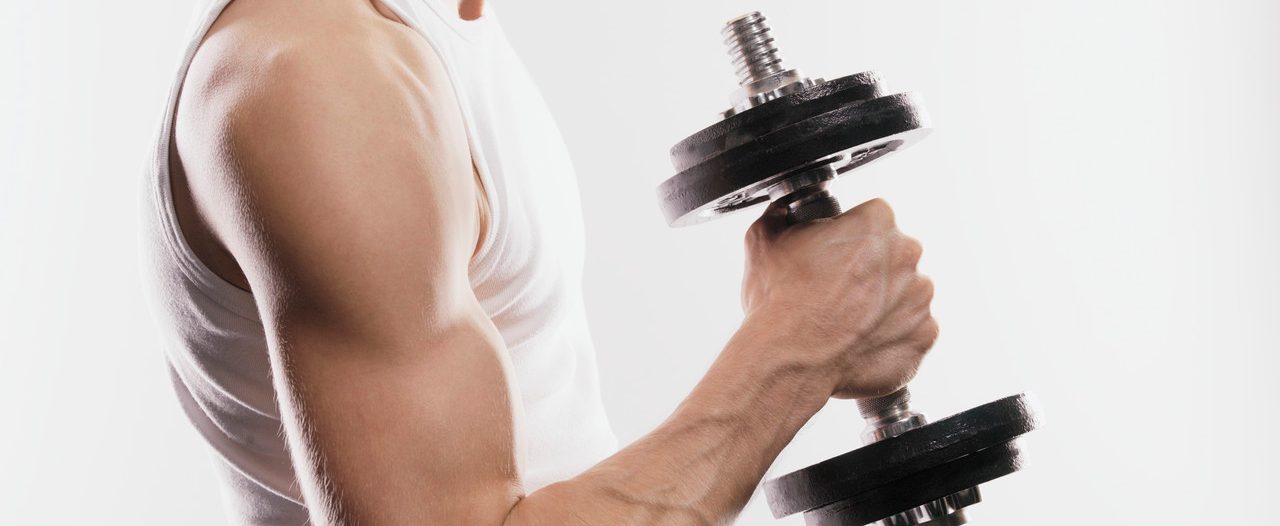Which Is Better: Weight Training or Cardio?

Adding strength training to your workout routine may be the best way to realize your fitness goals.
There is no arguing the fact that exercise is good for you — in fact, it’s required for health. So if you’re getting the recommended 30 minutes of moderate physical activity 5 times a week, that’s great! But are you seeing the improvement in your weight and overall condition you’d hoped for?
You may want to consider adding strength training to your routine to maximize your workout. A recent study found that just 20 minutes of weight training combined with aerobic activity is the most effective way to reduce your waist circumference — a common measure of health — and maintain lean muscle.
RELATED TOPIC: Why Strength Training Will Help You Be a Better Runner
Dreaded belly fat has received a lot of attention recently, largely because it predicts future health problems if left unchecked. Often, the fat around your midsection gets in between and around your vital organs (visceral fat). Excessive visceral fat is associated with higher levels of LDL (bad cholesterol), lower levels of HDL (good cholesterol), insulin resistance, hypertension, and inflammation.
Adding strength training to your routine — which can be bodyweight exercises, training with free weights or machines, or a combination of these — is an effective way to whittle your middle. Adding muscle raises your metabolism and causes your body to burn more calories, even at rest.
“Ultimately I like the combination of weights and cardio. You can burn fat off through cardio and through proper nutrition, but if you implement the weight training on top of everything else it will build lean muscle and essentially raise your resting metabolic heart rate throughout the day so that you burn more calories and reduce your waist circumference,” said Jen Hoehl, an ACSM certified exercise physiologist and professional trainer in New York City.
“But the reason that I like weight training is because most people, they want to get stronger, they want to get leaner, and the way to do that is through strength training,” she said, adding it’s also effective at reducing stress, and who couldn’t use help with that?
For strength training to have a positive impact on your waist circumference, you don’t necessarily need to focus all your training on your waist. Hoehl recommends some basic moves to get you started.
The squat
A proper squat works all the major muscle groups of the lower body. It engages your core and works your glutes, hamstrings, quads, and calves. A good way to start is to practice the motion using your bodyweight only. Once you’ve mastered the basic move, you can add dumbbells or a barbell to increase the intensity.
The squat works some of the largest muscles on your body, so learning the move and making it a regular part of your workout will have a significant benefit.
The plank
Next, Hoehl recommends the plank. She said that in order to make strength training a safe and effective part of your workout, it’s important to be able to engage your core. Your core is more than just your abdominal muscles. It’s basically everything from your mid-chest to your knees — your abs, lower back, glutes, quads, and hamstrings.
Work toward holding a plank for a minute, although few people can hold the position for more than 30 seconds their first time out, Hoehl said.
To do it properly you want to pull your shoulder blades back together, pull your stomach in, and engage your abs, glutes, and quads so that you keep your body in a perfectly straight line. There are a number of variations of the plank; it can be done with straight arms or to the side to add a challenge after you’ve learned the basic move.
The push-up
Finally, Hoehl recommends learning a proper push-up. The push-up strengthens your arms, chest, and shoulders and also engages your upper back, abs, glutes, and thighs. She said the trick to doing it correctly is engaging your upper back and squeezing your shoulder blades together so you really use your chest muscles to push up from the floor. She said a lot of people push through their shoulder blades and round out their back, but by sticking your chest out and pulling your shoulder blades back at the same time, you’ll engage the proper muscle groups.
Putting it all together
Mastering these basic moves will engage most of the muscle groups that give you stability when starting a weight training program. Your overall goals will dictate how you combine strength training with your cardio. But regardless of your goals, you should perform cardio should three to four days a week
For weight loss, Hoehl recommends an overall body strength training routine two to three days a week, followed by any type of cardio for 20 to 30 minutes.
“Generally I’ll have people use the weight training first and the cardio after. That way their heart rate is already in that fat burning mode, so when they do cardio they are totally burning the fat. That way they’ll get a little more effective use of their time.”
If you want to build muscle, she advises a routine focusing on chest, shoulders, and triceps one day, back and biceps another day, and legs on the third day — and including core exercises on all three days.
Adding strength training to your exercise routine doesn’t have to be intimidating. There are many free resources online to show you proper form and suggested routines. If you belong to a gym, look into hiring a personal trainer for a few sessions until you feel comfortable.
Updated:
April 08, 2020
Reviewed By:
Janet O’Dell, RN